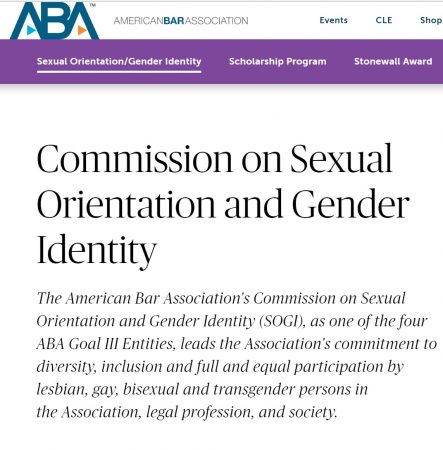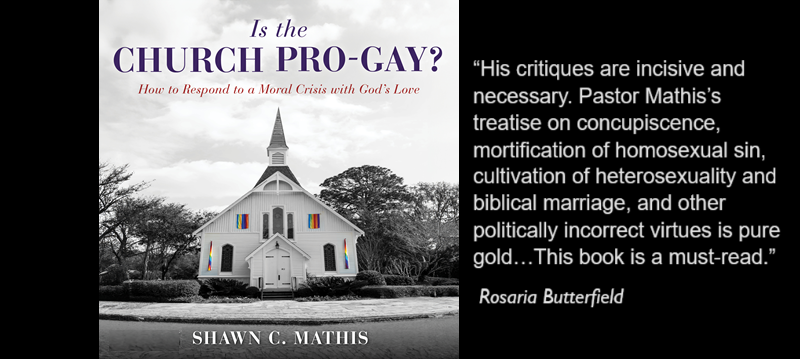(Reprint of my 2016 article)
Less than a decade ago, few would have imagined homosexual marriage would become the law of the land.
Maybe the same will be written ten years from now, only about the absence of Christian lawyers and judges.
That’s right. The Second Sexual Revolution is not satisfied with just excluding Christians from the service industry as florists, photographers and bakers—it is excluding the law profession, too.
Part of the groundwork was laid almost twenty years ago in Stropnicky v. Nathanson. This Massachusetts Supreme Court ruling determined that attorneys are part of the “public accommodation” clause in an existing anti-discrimination law. The feminist lawyer defending her freedom to accept only female clients lost. But the irony was likely not lost on the feminist.
Fast forward to today. The American Bar Association is currently considering tightening their conduct rules to include sexual orientation and gender identity, even of “gender expression.”
Rule 8.4 is the ABA conduct rule. But the rule is not overly specific. Therefore, there is more detail offered (labeled comments) that are helpful but not binding per se. That could soon change.
In fact, it has already changed in various states. States adopt their own version. But if the ABA changes, then more states will follow.

And those states with the more restrictive versions of the rule, like Indiana, have already used them aggressively against minor violations. One lawyer had gratuitously asked a harassing phone caller if they were gay. She was publicly reprimanded by the state supreme court.
The push to change the ABA rules comes from the bottom and the top. At the top, the president of the ABA, Paulette Brown, wants the revision to have more teeth:
“One problem, she said, is that applying the prohibition to lawyers who ‘knowingly’ discriminate may undercut its application in many cases. ‘Some have objected to the inclusion of “knowingly,” ‘ she said, ‘and I’m troubled by its inclusion in the rule.’ ”
This chilling opinion was given at a February 7, 2016 ABA meeting. But the soldiers of the sexual revolution want more:
“Other speakers who echoed Brown’s concerns also said the proposed amendments fail to define the ‘practice of law’ in a way that would encompass incidents of harassment or discrimination in the context of nonprofessional activities at law firms, such as receptions, dinners and other informal social events.”
The 2013 New Mexico court ruling against Elane Photography stated in passing:
“New Mexico Human Rights Act (NMHRA) does not prohibit a law firm, even one that is a public accommodation, from turning away clients with whose views the firm disagrees or with whom it simply does not wish to work; what the NMHRA forbids is for a law firm to turn away a client because the firm finds the client offensive on the basis of a protected classification.”
Such reasoning by the court was similarly used against a court-appointed Christian lawyer who objected to representing a minor who desired an abortion.
Naturally, if the attorneys must bow to the altar of sexual tyranny, so must the judges.
One Christian judge was found guilty and punished for simply asserting his belief before a private gathering of judges that he would be “uncomfortable” presiding over a same-sex ceremony.
In another case, a Circuit Court Judge was found guilty for not administering a same-sex ceremony even when he directed the couples to another willing judge.
Another judge was reprimanded after the committee found: “[he] created the appearance of impropriety by using words that may have reasonably been interpreted to show bias based on gender.” His daughter is a lawyer and his wife a feminist.
The Arizona’s Commission on Judicial Conduct 2015 opinion states that a “sincerely held religious belief” is insufficient grounds for a judge to turn down presiding over marriages he is conscious-bound to reject.
The 2015 opinion goes further:
“A judge may also choose to conduct marriages only for friends and relatives to the exclusion of all others. Such a choice would not run afoul of Rule 2.3(B) because it is not based on sexual orientation. Of course, a judge who performs marriages only for friends and relatives would violate Rule 2.3(B) if the judge refuses to perform marriages for same-sex friends and relatives.”
But, like the leech of Proverbs 30:15, the wicked cry, “Give! Give!” The sexual revolution is not satisfied with silencing lawyers and judges. It wants to root out religious law schools.
Already in Canada, a Christian law school is under fire from the state, even as three other provinces vow not to admit any graduates even if the school wins in court.
Americans are not immune. In December of last year, the State Bar of Texas was asked to deny accreditation of a Christian legal ethics course because it is “too religious.”
Of more significance is the 2016 complaint lodged against Brigham Young University. It seems that the University’s law school is discriminatory in requiring its student to adhere to its Mormon rules, such as upholding heterosexual relationships.
At this rate, I may be writing an essay five years from now about the lack of Christian lawyers.






Great post. The church is way behind in discussing these issues. For a lawyer, taking on these clients is going to be a low-profit enterprise since they have such disordered lives. A huge chunk of making money is selecting the right customers. The ABA obviously wants to take this away, but how can they really? How can they prove why a lawyer turned-down a client if the lawyer simply says, “I’m unavailable for this?” You SHOULD be allowed to turn down a client for ANY stated reason, but if that right is taken away, it’s still very difficult for them to prove why you turned down a client if you give no reason. This must’ve been a problem in the first century church as well and there were CHristians in high places who figured out how to navigate it. For example, there were Christian centurions and soldiers who must’ve stopped praying to Mars like the others. There were proconsuls (generals) who converted in Acts 13, and must’ve found a way to abstain from the imperial cult and other pagan religious obligations of their office.
These ideological requirements are being added at every entrance point into the professional classes, namely the education system, but also to work at a corporation. If the Christian colleges and schools become scarce and public colleges have ideological entrance requirements, we may have to figure out how to advise our kids in whether they can enter these professions at all. If corporations increase their ideological requirements, there may be no point in getting a professional degree. This will definitely affect the church in high-cost urban areas. You can be poor in the United States, but that either involves going on public assistance for food and housing or moving out to the boonies where the mountains are high and the emperor is far away.